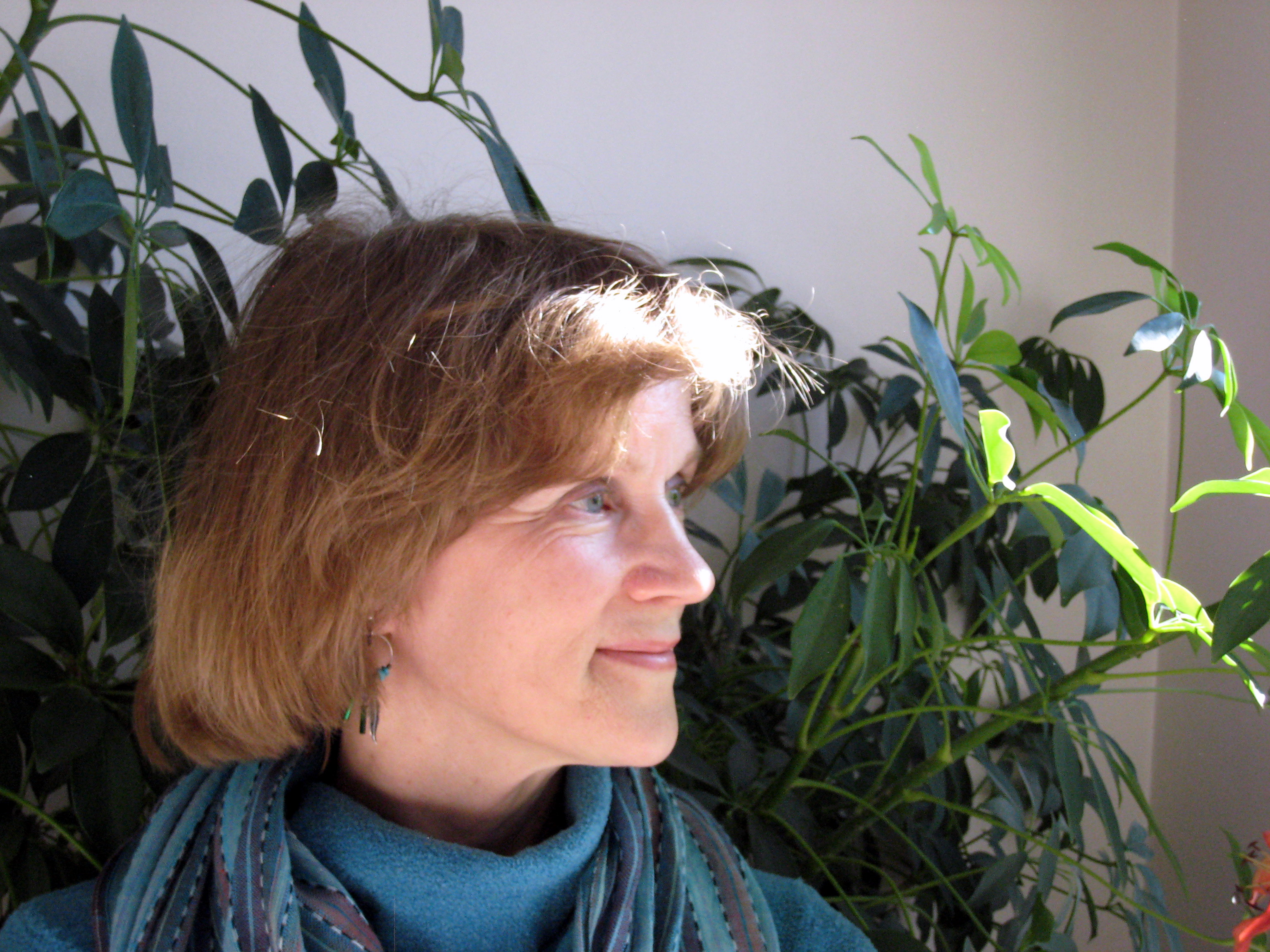It happens faster than I can think: shadow, form of man, thrust of arm—
My hand understands; flies to my chest while my mind straggles behind, stupidly stringing bits of fact, bone handle standing from my blouse, liquid warm against my fingers, purse vanished as if it never was.
Understanding comes as the knife did, sharp and instant, with the apprehension of pain; but there is no pain, just numbness of chest—the body’s dread of something gone terribly wrong, and breathing so strained I can’t speak.
I’m still sitting. My mind focuses on this amazing fact: I’m still upright, marble bench cold under my splayed fingers, briefcase miles away on the floor next to feet that seem to belong to someone else. In a glass vault I’m washed by a din of voices and the impossible summer sound of…fountains? My hand can’t lift itself toward the river of people streaming by, oblivious to a well-dressed woman sitting under the ficus tree, dappled by sun from the vaulted skylight. My gurgled breathing is lost in the hiss of the fountain. The knife, buried in the shadow of my open jacket, is safely hidden in my slump. There is little blood and I breathe slowly, afraid of drowning…
The ring of an elevator brings me to the moment as if I’ve been gone weeks instead of seconds. My eyes find the briefcase and it all comes back, my speech, the reason I am here. A sharp, aborted laugh moves fluid cruelly in my chest. Eighteen years navigating the worst sections of the city to be taken down in my best blue suit in the posh lobby of the Radisson—Royale?…my mind won’t work…one of those big R’s—retribution for the lies I’d prepared for a dark room of hopeful faces.
Or have I already spoken?
I can’t feel my feet, now, but my shoes are closer. Malicious things, heels; announce a woman with their clickity-clack then impede her flight. But the new blue shoes had been blameless. Might even have been a weapon, if I’d had time. A grisly thought, driving a heel through chest or temple; the tear of flesh, the rip of muscle, but all’s fair in love and—
When, I wonder vaguely, had it become war?
In front of me a dizzying river of feet and legs pass in pairs and in pairs-of-pairs. Beneath them the marble floor winks—freckles of quartz in white and salmon. Help, I plead of the feet, but my lips move without sound. I could be one of my own cases: Edith Bates, maybe, lips moving faster and faster with the speed of her rocker until she manages to spit out the only thought left to her: “Go to Hell!” And me, chagrined at my impulse to shove her rocker over backwards—to watch the lap-robe fall over that grizzled, angry face—searching myself for an iota of compassion while I scout her apartment for danger. Stove off. Heat on. Electrical outlets de-massed. What wasn’t a danger these days to the Edith Bateses living alone?
Struggling for breath, I wonder now if Edith had been cursing me after all, or if she’d been screaming the frustration I am feeling, frozen to the bench: I am here! I am alive!
And I am alive. That’s the remarkable thing. But for the knife in my chest, I might be sunning in the sky lit fountain-mist. Stabbed umpteen times and lived. You heard it all the time on the news. Why men had invented guns, probably. Knives didn’t do the job.
My hand at my chest feels gingerly for blood; if I can’t speak, I will write: smear an SOS on my skirt, on the bench, anywhere someone can see. But the blood is sparse under the shirt, a trickle to my waist. My shaking hand inadvertently finds the knife, (God!), and leaps away—but not before the fingers have made it hard and real, more awesome than my eyes have let on. Too late now for instinct to tear it out; my mind has already conjured the rising flood inside. The vision moves uncontrollably to Tony T., a heap on steps when I’d first found him and convinced him that drugs would do him in.
Tony had believed me. He’d cursed and sweated his way through rehab, and started over. Tony’s dealer took it hard, though—took to calling Tony in the middle of the night to say so, then started leaving him free samples in the glove compartment of his Chrysler. Finally, when the samples didn’t win Tony back, the dealer had a heart-to-heart that left Tony in six pieces on his sister’s front steps…
It’s a dangerous memory; sets my heart thumping, shooting panic into my veins. My cry is a choke in my upper throat, and is answered by extraneous clips of lives flowing past:
“…gotta be aware of the gap between the money market funds and…”
“Come by at seven. I’ll have the…”
“…clams, on the other hand, sit on the bottom and eat any old crap that…”
Their indifference is more frightening than the knife, and suddenly I find myself without air. Focus. Focus, I am urging Mary Beth Moore the night before her abortion. “Just push the fear into a tiny spot in the center of your chest. Hold it there. Observe it. See how it becomes manageable?”
“But I’m scared,” Mary Beth wails.
I bite back my impatient response: time to have been scared was before you laid the hockey team. “You’ll be fine,” I say, bringing her a glass of yellow tinged water from the kitchen. But Mary Beth, plucked from childhood at twelve to fill her dead mother’s shoes, from need and from fear aborts the abortion and grows yet another Mary Beth, who mothered by Mary Beth will know nothing more than to grow another, and another, and in a city already teaming with Mary Beths, Mary Beths will spill out of chipped-paint doorways, pile into garbage strewn alleys, and stagger onto the streets. I lift the glass and hurl it at the marble floor…
Jerked upright by my own reflex, I remember the seminar. Surely it must be nearing time. Someone will be looking for me—I’m the guest speaker, for god’s sake—though they may not want me now. Bad form to lecture with a knife in your chest.
Take the briefcase, I instruct a pair of passing loafers. Deliver my prescriptions for a better city. Beautiful lies.
But the shoes don’t slow, and I sense people drifting away. The knife, probably—it makes them uncomfortable, pretending not to see. It’ll be easier after the camera has done its job; when they can look without being seen—can see from a distance too great to feel. I remember that river, the picture of that river—years ago, now—bodies, bodies, floating down the river in…Rwanda, maybe…people harvested like logs, tossed into the stream toward the mill but there was no mill, just bodies with no place go but down the river around the bend, out of sight of the camera’s eye where they would exist no more.
I’d studied that picture a long time. And that’s when I knew I couldn’t feel, anymore—when standing there I felt nothing but the shadow of Candy K’s laugh flitting across my soul. Ah, Candy K. The only one to ever call me on my fantasies. He’d heard them all, too: “The best dreams are those you can’t come down from…Education is money in the bank…Honest work is its own reward—”
Candy K had laughed, hand on his belly as if it might shake away. “Missy, you don’t know nothing about the real world,” he’d said, as if to a dull but likable child. He tapped his finger on the flesh just below my shoulder blade—the only time he ever touched me. “There ain’t no rules, cause it ain’t no game, no more than it’s a game ‘tween a tiger and a mouse.” Then he grinned, and saluted, and he walked out. And he’d never come back—though driving by the agency he never failed to honk and wave if I was at the window.
And of all my cases, Candy had done the best. He had money. An education suited to him. The respect of his peers.
Hell, he was alive. Alive despite me—busy little bee, bashing itself senseless at the window trying to reach the light.
The shadow of a cloud pushes off, biting my eyes with the splendor of the lobby. Through it I can see its structural crumble and decay. Around me, unheeding, the stream of people continues endlessly. A river of the dead, drifting by, open eyes no longer seeing.
I’m tired of holding myself up in the current. It’s time to let go—but as I make up my mind to do so, my body develops a will of its own; at once I am gasping for air, kicking and fighting, refusing to go under—
In my struggle I don’t at first notice the depths stirring at my side, something rising, rising, rocking the water until with startling energy it breaks the surface with waves that threaten to engulf me.
It is a man. His skin is the color of mahogany, and as he rises from the water the river falls away, beading on his arms and chest, catching the light. Oblivious to me and to the bodies bumping us both he struggles for footing, energy focused on the inert burden in his arms…
A child. Slack and unmoving, head lolling against the curve of the man’s elbow, arm hanging limp in the water, where the current makes a swift track around the dangling hand.
Pushing against the river’s force, the man takes a step toward shore. He steadies himself and steps again. He is close enough to touch—so close I can feel the heat of his effort. And now I can see what I couldn’t before: beneath the surface of the child’s chest.
Movement. A riot of movement—the frantic, beating wings of a trapped bird. I can’t tear my eyes from it. And as I watch, the knife in my chest at last begins to burn, but it is the child’s struggle I feel flaming there. And it is the man’s grief that is filling my lungs, rising like bile until there is no place to go but out.
He lifts his head, but it is my throat that takes the rip of his cry, that stirs the water for miles, that rocks the dead so that at least a few of those bodies roll over and their sleepy, glazed-eyes open. And I see them see. And I see them reach. And as my eyes close I feel them—hands and hands and hands—reaching for me as my body softens and slides under.
B. Russell Isbell’s fiction has appeared in numerous journals including


